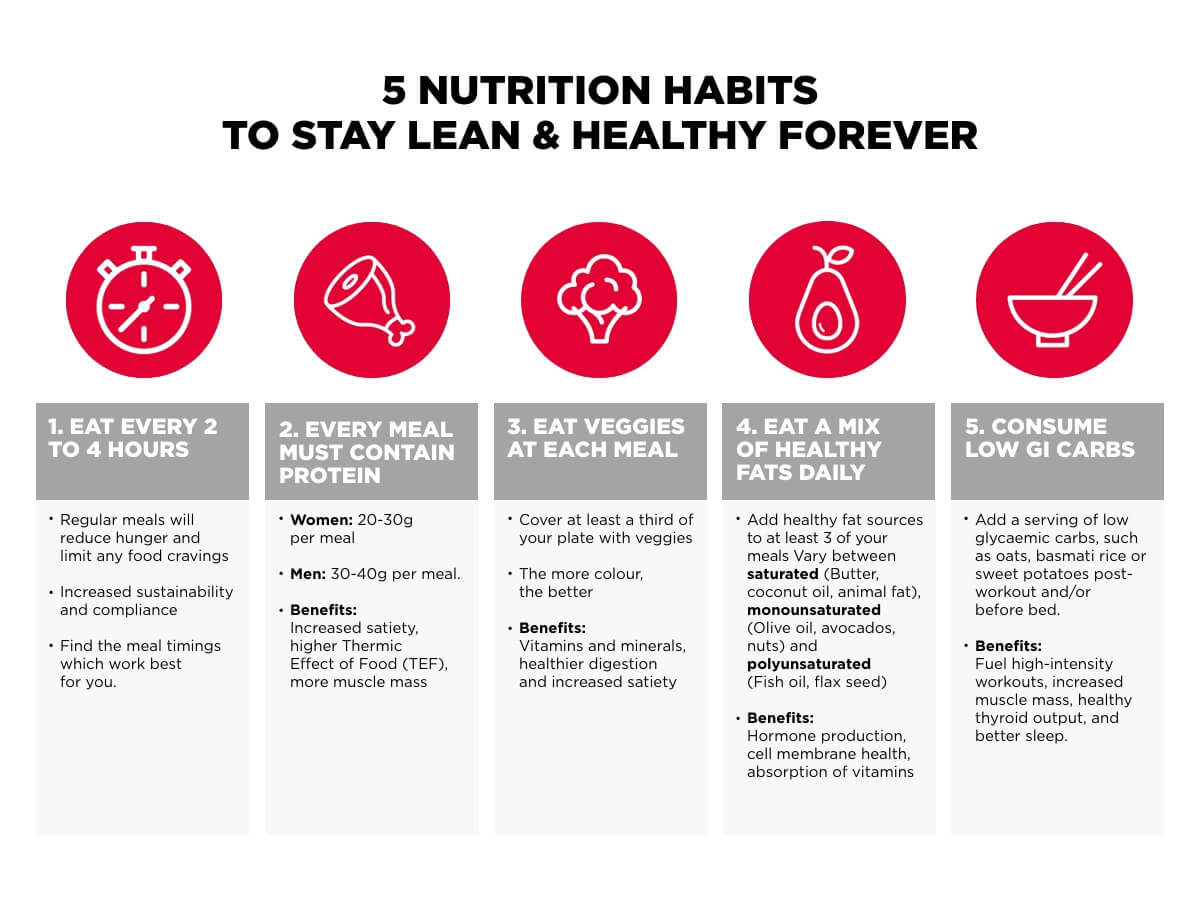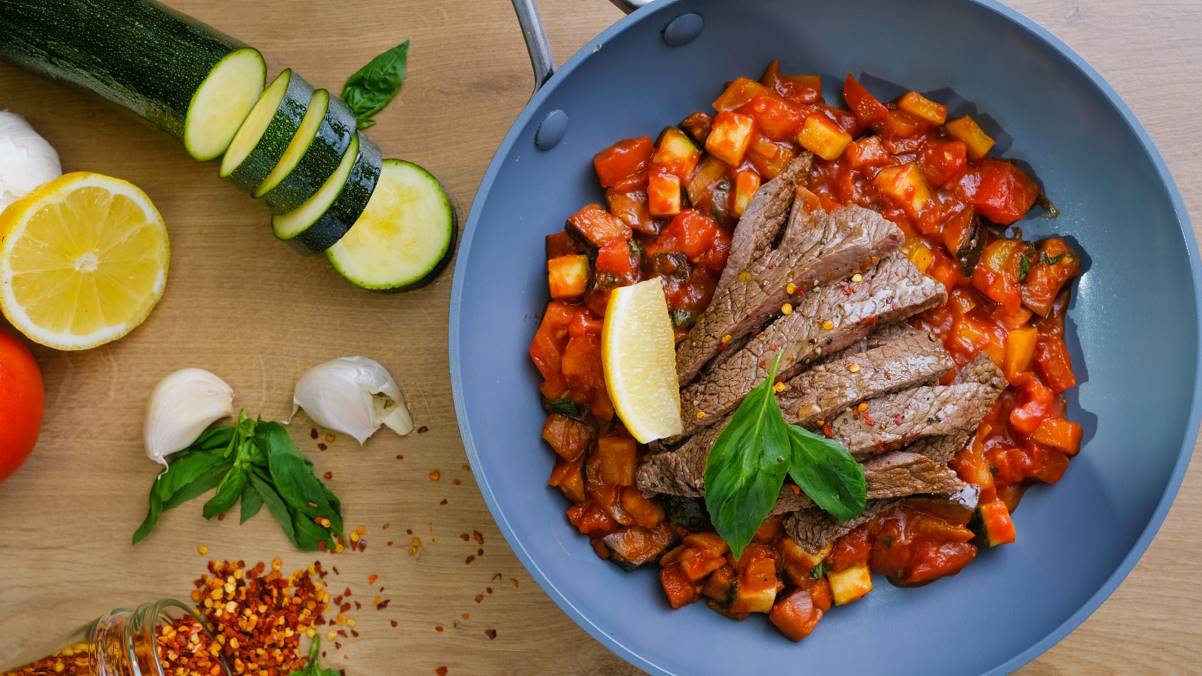At Ultimate Performance, we don’t subscribe to any one specific nutrition philosophy, as the client’s individual needs dictate the direction we steer them towards.
However, what we’ve found over the years is that our advice is almost always rooted in five key nutrition habits.
How detailed and specific these habits need to be followed very much depends on the client’s goal and starting point.
For example, a client who wants to get from 30% to 20% body fat will have a much ‘looser’ plan than a client looking to go from 10% to 8%, where every detail needs to be accounted for.
Regardless of the goal, following these five habits won’t see you go far wrong and will help keep you lean and healthy forever.
Want something to hang on your fridge, or show to colleagues at work? Print it!

Habit #1: Eat every 2 to 4 hours.
While the exact times are not important, the key takeaway here is to make sure you’re eating regular meals every day. Eating every two to four hours will generally work out to be between three to six meals a day. Where you fall on that spectrum depends on your lifestyle and most importantly, what you feel best on.
This habit is vital in maintaining blood sugar levels, which in turn will reduce any food cravings and hunger. From a compliance perspective, staying satiated is absolutely essential.
Eating far too little with excessive gaps in between meals is a recipe for disaster, and an ‘accidental’ box of biscuits waiting to happen. Habit #1 will prevent this.

Habit #2: Make sure every meal contains a source of protein.
One of the few uncompromising rules we have with clients is that every meal must contain a source of protein.
For the majority of clients who walk through the door, protein consumption is almost always inadequate.

If real body composition changes are what you are after, you must adhere to this habit.
A simple rule is this. For men, aim for 30-40g per meal, which is around 150-200g of uncooked chicken breast. For women, aim for 20-30g per meal.
Have a look at our food list below and make sure each time you eat, one of these options are on your plate.

Click HERE to download your collection of FREE advanced UP workouts
Three main reasons why protein is essential to improving body composition:
1. It’s Satiating.
Linking back to habit #1, adequate protein intake will help keep you feeling full.
Think about this. How do you feel when you eat a cake, versus when you eat a steak?
The cake will likely leave you a little peckish after an hour, whereas a steak will keep you full for at least the next three hours.
2. High Thermic Effect of Food (TEF)
TEF refers to the increase in energy expenditure above resting metabolic rate due to the cost of processing food for use and storage.
Protein in comparison to carbohydrates and fats, is much tougher to break down and digest. It’s more metabolically expensive and so costs the body more calories. Studies vary, but some have shown the TEF of protein being anywhere from 25-30%, whilst carbohydrates (5-10%) and fats (2-5%) are significantly less.
3. Growth and Repair
Protein’s primary role in the body is to grow and repair tissue. This ranges from your hair and skin to, more specifically, your muscle cells.
If you’re training hard (which we’ll assume you are doing) your demand for protein increases. To create body compositional change, we need a higher level of training frequency, and so protein intake should reflect this.

Muscle is metabolically expensive, so you need to feed the machine!
Habit #3: Eat veggies with each feeding opportunity.
We all know that eating your vegetables is important…but why?
Here are three reasons:
1. Packed with vitamins and minerals.
No supplement can replace real food. Despite the diminishing quality of our vegetable farming, eating a wide variety of vegetables is still best for making sure your vitamin and mineral needs are met. It’ll also help with detoxification and suppression of inflammatory markers. So if you want to look younger, eat more vegetables.
2. Healthy digestion
Vegetables (especially green vegetables such as green beans, kale, broccoli etc.) are typically high in fibre, which will help keep you ‘regular’. This may be particularly important if following a lower carbohydrate diet.
3. Satiety
Satiety is something we keep coming back to. A sustainable diet is one that keeps you compliant, year round. Staying satiated is the easiest way to do this, as it prevents cravings, hunger pangs and any diet ‘outbreaks’.
Vegetables provide this through their high fibre content and overall food volume.
A good rule of thumb with vegetables is to make sure it covers at least a third of your plate. If you’re on a low-carbohydrate diet, make half a plate of protein and half a plate of veggies.

Habit #4: Consume a mix of healthy fats daily.
Out of all the macronutrients, dietary fat has arguably got the worst reputation. It’s been linked to the obesity crisis, high cholesterol and even heart disease.
While dispelling those myths goes beyond the scope of this article, numerous studies have now proven that fat isn’t the bad guy.
If you want to live a lean and healthy lifestyle, you need fat. It’s an essential nutrient for the body.
Here’s why:
1. Fat is important for the absorption of fat-soluble vitamins through the small intestine (A, D, E and K). If you want the goodness from those veggies you’re eating, you need fat in your diet.
2. Fat is needed to maintain cell membrane health. Cell membranes surround every cell in your body, and their health is critically important in managing inflammation and metabolism.
3. Fat is key in hormonal production.
4. Fat is a great energy source when on low carbohydrate diets.
So what determines ‘healthy’ fats?
It’s important to have a wide range of fats in your diet. Saturated (animal fat, eggs, coconut oil, butter), monounsaturated (olive oil, avocado, nuts) and polyunsaturated (fish oil, flax seed) fats all have their own role to play in the body. Worrying about how much of each can make things needlessly complex for the average person.
To make things simple, add a source of healthy fat a couple of times a day into your diet.

What we will actively discourage is the consumption of trans-fats, which are ‘man made’ and strongly associated with a number of health complications.
Habit #5: Ensure the majority of your carbohydrates are consumed either around training and/or at night.
Just like fats don’t make you fat, carbs aren’t the devil either. While not an essential nutrient in the body, there are some clear metabolic benefits:
1. Fuel high-intensity workouts.
Keeping some carbs around your training times can help boost performance, strength and recovery.
2. Increased muscle mass.
After training, muscle protein breakdown is at its highest. Providing the body with carbohydrates at this stage can provide glycogen replenishment when you’re most sensitive, as well as an increased insulin spike to create an ‘anabolic environment’ after training.
While some dismiss the window of opportunity that training provides, our experience with thousands of clients has shown us that having your carbohydrates post-workout can really help with building muscle and losing fat.
3. Thyroid output.
Carbs can affect thyroid function directly due to the role insulin has in the conversion of the inactive T4 hormone, into the active T3 hormone (responsible for a healthy metabolism).
4. Better sleep
There are two times in the day we like to add carbohydrates: after training, and before bed. Simply put, carbs at night can help ‘relax’ the body and improve your sleep. To read more on how to use food for better sleep, click here.
Good carbohydrate choices include a 1-2 cup serving size of basmati rice, sweet potatoes or oats.
Meal plans, macronutrient targets and strict diets all have their place. When you really need to dial things in, these are essential tools in creating radical body transformations.
However, to be able to keep your physique for life, and make the diet sustainable, we need to ingrain good habits.
The five habits we’ve discussed in this article are what we find to be the most ‘bang for your buck’ habits to master in staying lean and healthy forever.



